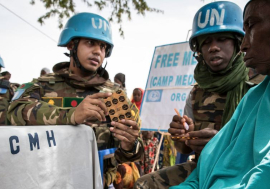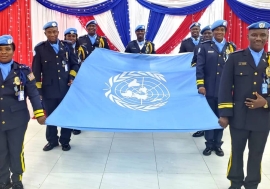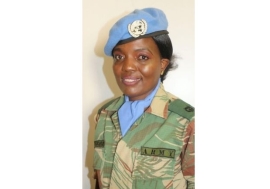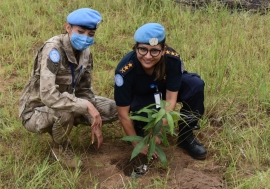Protecting civilians from genocide
When Eugenie Mukeshimana and Suad Mansour met on the eve of the twelfth anniversary of the Rwanda genocide, little did they realize how much they had in common. Eugenie survived the 1994 Rwanda genocide but she lost most of her family. Six of Suad’s relatives were killed in Darfur, in western Sudan, and the rest are in a refugee camp, in constant fear of more attacks by the murderous Janjaweed militia. Help is yet to arrive. “It is as if the world never learned any lessons from Rwanda,” Eugenie says.
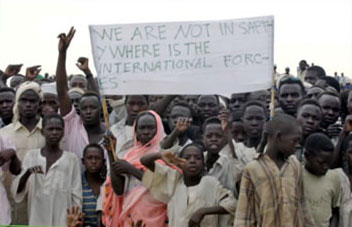 Residents of a camp for displaced people in southern Darfur appeal for international protection.
Residents of a camp for displaced people in southern Darfur appeal for international protection.Eugenie and Suad were among the speakers at a meeting held at UN headquarters to mark 12 years since the April 1994 genocide in Rwanda. Another participant, Mr. Juan Mendez, former president of the International Centre for Transitional Justice and now special adviser to the UN Secretary-General on the prevention of genocide, noted that a dozen years after the Rwanda genocide and faced with comparable atrocities in Darfur, the international community is “still having the same debates we had in 1994.”
Yet, as UN Secretary-General Kofi Annan pointed out last year, “when it comes to laws … we are blessed with what amounts to an international bill of human rights, among which are impressive norms to protect the weakest among us, including victims of conflict and persecution.”
Among those norms is the Genocide Convention, signed in 1948. It commits all governments to act to prevent and punish acts of genocide, ethnic cleansing, war crimes and other crimes against humanity. In September 2005, at the UN World Summit, 150 leaders from across the globe reaffirmed that “responsibility to protect,” using all necessary means, including, where appropriate, military force.
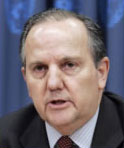 Juan Mendez, UN special adviser on the prevention of genocide:
Juan Mendez, UN special adviser on the prevention of genocide:“We need to talk about early warning and early action in ways that can help prevent genocide without waiting until the last minute.”
Despite such pledges, Suad’s family and thousands of others continue to face attacks and forced displacement. In Darfur alone, varying estimates of between 200,000 and 400,000 people have died since 2003, while UN relief agencies place the number of refugees, displaced people and others requiring relief aid at 3.6 million. In northern Uganda, Côte d’Ivoire and the eastern Democratic Republic of Congo (DRC), many more are also suffering and under threat. For such people, says Mr. Annan, “there is no solace in the unimplemented words of the Geneva Conventions, to say nothing of the international community’s solemn promises of ‘never again’.”
Hesitant and tardy
The problem, says the UN Secretary-General, is not a shortage of international laws and treaties. The problem is getting countries to act on their commitments. “We continue to lack the needed political will, as well as a common vision of our responsibility in the face of massive violations of human rights and humanitarian catastrophes occasioned by conflict.” Despite massacres of “near genocide proportions” in the DRC, Liberia and elsewhere, “our response to them has been hesitant and tardy.”
Mr. Pierre Prosper, a former US ambassador-at-large for war crimes, agrees that it is difficult to get member countries of the UN, particularly in the Security Council, to make and support decisions for a quick and effective intervention. “Quite frankly,” he said at the UN meeting, “the Security Council is inherently slow because of all the politics involved in its decision-making.”
Mr. Prosper argued that since “different political agendas” often make the Security Council slow to act, citizens threatened with violence should be able to turn to regional organizations like the African Union to protect them. “Logistically, it is quicker for a neighbour to respond to help protect lives. It is far quicker for a regional organization to respond.”
‘Set up for failure’
One such regional initiative is the African Union Mission in Sudan (AMIS). In 2004 the African Union, European Union and the UN negotiated with the government of Sudan to permit the placement of African troops in Darfur. The presence of 7,100 AU troops and observers has led to a reduction of violence, but their numbers are inadequate to police Darfur, an area as large as France.
In May 2006, UN Under-Secretary-General for Humanitarian Affairs Jan Egeland argued that AMIS needs more trained soldiers, helicopters, trucks and communications facilities, as well as more reliable international funding.
Mr. Mendez notes that international financing for the AU mission falls $200 mn short of what it requested. The mission therefore never “had the capacity to do the job, it never had the support,” he commented. “The Security Council and, I would say, the international community, has almost set up the African Union for failure.” Under such circumstances, he added, it is unrealistic to expect a regional organization to solve the problem.
While the AU force may be weak, Mr. Egeland points out, its presence does have some impact. That is important while a consensus is being built for a stronger UN peacekeeping mission to take over. Establishing such a mission may take some time. First, the Sudanese government and the Security Council will need to reach agreement. Major contributors will then have to provide sufficient funding and military personnel. Mr. Egeland notes that “we are overstretched now, in terms of peacekeeping obligations, all over the world. So it might be hard to get enough soldiers.” Realistically, he estimated, it may take nine months to get a UN force on the ground.
In the meantime, political pressure is needed to ensure more resources for AMIS. “Strengthening the African Union force could happen tomorrow,” Mr. Egeland argues. “It is a question of enough parliamentarians and congressmen and -women in enough countries just saying, ‘We are going to give adequate resources,’ and getting enough African states to say, ‘We will send more high-quality soldiers and police to Darfur.’ That should have happened yesterday and could happen tomorrow.”
With consent or without
As in Rwanda, Darfur and the DRC, massive crimes against humanity frequently take place as part of ongoing conflicts or wars. And measures to halt genocide and other abuses often require intervention by other countries to end the killings or bring relief aid to suffering populations.
Ideally, the easiest and most effective interventions occur when the combatants themselves agree to participate in a peace process. “There is a real correlation between the agreement or the consent of the parties and the potential for early, meaningful success of the missions,” says Ms. Jane Holl Lute, the UN’s assistant secretary-general for peacekeeping missions.
Such consent makes it possible for external actors to engage in a whole range of activities, including negotiation, enquiry, mediation, conciliation, arbitration or judicial settlements. Also, if warring parties fully accept the terms of a peace agreement, they are more likely to ensure that their combatants do not harm civilians, to comply with demobilization and disarmament provisions, to allow the distribution of relief aid and to permit displaced populations to return to their homes.
However, when consent is not given and mass killings continue, that can create a political challenge for the international community. In Sudan, for example, the government is not fully cooperating with the African Union mission and has not yet agreed to the deployment of a UN force to replace it.
Lack of consent from rebel or militia groups also poses challenges. In Darfur, neither the pro-government Janjaweed militia nor two of the three rebel groups have taken part in the peace talks; they continue to attack civilians and have obstructed the work of humanitarian relief agencies. In the eastern DRC, some rebel groups regularly attack villagers and then withdraw back into the jungle.
Under Chapter Seven of the UN Charter, the Security Council has the authority to approve the use of sanctions or military action to stop genocide or mass killings, without the consent of the governments or other military forces involved in such atrocities. However, for varying political or economic reasons, some UN member states may oppose either sanctions or force. Any of the five permanent members of the Security Council – China, France, Russia, the UK or the US – can veto a decision to intervene.
“Until we get to the stage where vetoes are not applied,” says Mr. Colin Keating, New Zealand’s former ambassador to the UN and president of the Security Council during the Rwanda genocide, “we will never be able to say that we can respond effectively to such crises.”
Even if the Security Council can agree on intervention, it would still be important to “exhaust every possibility of a negotiated solution,” Mr. Keating told Africa Renewal, since forceful military intervention could have “much more serious consequences.” Other options may include diplomatic efforts or even targeted sanctions to pressure a government to agree to serious peace talks or to accept some form of intervention.
Similarly, Mr. Mendez argues that it would be a mistake, as some suggest, to completely isolate or shun a recalcitrant government. It is “not realistic to disengage completely,” he says. “It is not only unrealistic, but it won’t help to find solutions either. The problem is not whether to engage, but how to engage. In the case of the regime in Khartoum, the international community has not told that government forcefully enough that its conduct in Darfur is unacceptable, that it cannot go on doing this.”
Positive changes
Despite the difficulties, positive changes have taken place. A number of measures to better protect civilians are now common in peacekeeping and relief operations. They include:
- Greater use of international civilian police to help local forces keep peace
- More experts to monitor humanitarian norms, human rights and criminal law by combatants
- More systematic disarmament and demobilization of ex-combatants
- The placement of refugee camps far from borders and war zones to better protect the refugees.
Perhaps most significantly, the mandates of UN peacekeeping operations have often been strengthened to allow peacekeepers to stop attacks on civilians and to militarily engage combatants. In Rwanda, the UN mission was permitted to shoot only in self-defence. Today UN peacekeepers in the DRC routinely confront armed groups in order to protect civilians.
The UN also frequently supports regional or country-led forces that are able to respond quickly to massacres. Troops from the Economic Community of West African States helped stabilize Sierra Leone and Liberia before strong UN peacekeeping missions could be put into the field. French troops played an important role in both Côte d’Ivoire and the eastern DRC and South African troops led an African Union mission in Burundi.
The prosecution of war criminals and those responsible for genocide is another tool. According to Mr. Mendez, impunity “breeds insecurity among populations at risk and creates an incentive for repetition among the offenders.”
The international tribunals for Rwanda, Bosnia and Sierra Leone set up to prosecute the crimes committed in those countries will hopefully send the message that those who attack and kill civilians will no longer get away free. The International Criminal Court in The Hague is currently investigating rebels, militia forces and military commanders in the DRC, northern Uganda and Sudan who are suspected of war crimes and crimes against humanity.
Ultimately, Mr. Mendez points out, the best way to protect civilians is to head off atrocities before they can escalate into genocide. “We need to think about prevention in means other than military intervention.” Massive human rights abuses, crimes against humanity and war crimes also elicit “a moral obligation to act,” he says. “We need to talk about early warning and early action in ways that can help prevent genocide without waiting until the last minute, when the only thing that will prevent genocide is military action – and when, as in Rwanda, we will be told it is too late.”











